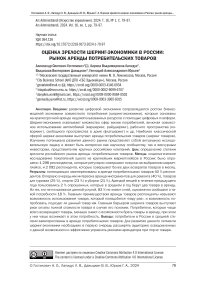Оценка зрелости шеринг-экономики в России: рынок аренды потребительских товаров
Автор: Гостилович А.О., Лапидус Л.В., Давыдкин В.В., Юрьев Г.А.
Журнал: Ars Administrandi. Искусство управления @ars-administrandi
Рубрика: Информационные и цифровые технологии в публичном управлении и экономике
Статья в выпуске: 1 т.16, 2024 года.
Бесплатный доступ
Введение: развитие цифровой экономики сопровождается ростом бизнес- моделей экономики совместного потребления (шеринг-экономики), которые основаны на краткосрочной аренде недоиспользованных ресурсов с помощью цифровых платформ. Шеринг-экономика охватывает множество сфер жизни потребителей, включая совместное использование автомобилей (каршеринг, райдшеринг), рабочего пространства (коворкинг), свободного пространства в доме (флэтшеринг) и др. Наиболее классической сферой шеринг-экономики выступает аренда потребительских товаров (шеринг товаров). Изучение потенциала развития данного рынка представляет собой актуальную исследовательскую задачу и может быть интересно как научному сообществу, так и венчурным инвесторам, представителям крупных российских компаний.
Цифровая экономика, экономика совместного потребления, шеринг-экономика, шеринг товаров, аренда потребительских товаров, маркетплейсы, цифровые платформы
Короткий адрес: https://sciup.org/147246782
IDR: 147246782 | УДК: 364.126 | DOI: 10.17072/2218-9173-2024-1-79-97
Текст научной статьи Оценка зрелости шеринг-экономики в России: рынок аренды потребительских товаров
,
Развитие шеринг-экономики, или экономики совместного потребления, представляет собой один из сильнейших трендов цифровой экономики (Лапидус, 2023). В 2021 году Российская ассоциация электронных коммуникаций (РАЭК) совместно с независимым аналитическим центром и консалтинговой компанией «ТИАР-Центр» опубликовали отчет о развитии экономики совместного потребления в России. Исследование показало, что с 2017 по 2020 год объем экономики совместного потребления в России вырос с 392 млрд рублей до 1,07 трлн рублей, при этом среднегодовой темп роста составил 39 %1. Самой динамичной сферой стала «аренда вещей», или аренда потребительских товаров, количество транзакций в которой увеличилось с 25 тыс. в 2017 году до 130 тыс. в 2020-м, а в денежном выражении объем транзакций достиг 410 млн рублей при среднегодовом темпе роста 78 %. Исследовательское агентство “360 Research Reports” оценивает среднегодовой темп роста экономики совместного потребления в мире на уровне 32,08 % и прогнозирует рост объема мирового рынка со 113 млрд долларов в 2021 году до 600 млрд к 2027 году2.
Подобные перспективы роста шеринг-экономики формируют предпосылки для создания новых компаний и трансформации бизнес-моделей уже существующих крупных игроков рынка. Так, в России еще в 2014 году появился сервис “RentMania”, представляющий собой онлайн-платформу, где пользователи могут сдавать в аренду другим пользователям любые свои вещи; с 2023-го сервис функционирует под брендом “PolkaRent” и позиционирует себя как доску объявлений для аренды вещей с безопасными сдел-ками3. В первые два года работы на развитие этого проекта было привлечено более 600 тыс. долларов венчурного капитала4. В 2016 году появился проект “Next2U”, предлагающий не только оставить объявление о сдаче в аренду личной вещи, но и бесплатную систему управления прокатом, позволяющую любому человеку заняться бизнесом по аренде товаров5. В 2018 году был заре- гистрирован сервис аренды вещей без залога «Арентер», выручка которого составила порядка 30 млн рублей в 2021 году, продемонстрировав рост более чем в два раза по сравнению с 2020-м6. Наконец, на рынок аренды товаров выходят крупные игроки российского ритейла, такие как «ВсеИнструменты. ру» (сервис «ВиРент»), «Мобильные ТелеСистемы», «Связной», «Спортмастер» и др.
При всех возможностях шеринг-экономики для бизнеса она способна подорвать бизнес-модель классического ритейла, даже в сфере электронной коммерции (Mai and Ketron, 2022). Возникает закономерный исследовательский вопрос: есть ли смысл в ближайшее время крупным ритейл-игрокам выходить на рынок аренды товаров?
Целью данного исследования является определение степени зрелости рынка аренды потребительских товаров в России. Задачи исследования: оценить заинтересованность в аренде товаров российских потребителей; определить осведомленность людей о возможности брать товары в аренду и долю активных пользователей данного рынка; выяснить, какие категории товаров потребители готовы взять в аренду в первую очередь; выявить драйверы и барьеры развития рынка аренды товаров в России.
Исследование проводилось в декабре 2022 года – январе 2023-го. Авторы исходили из того, что опрошенные пользователи одного из крупнейших мар-кетплейсов в России в достаточной степени характеризуют потенциальный спрос в шеринг-экономике. Опрос двух выборок был направлен на проверку гипотезы о том, что потребители, которые часто делают возвраты на маркет-плейсах, в значительно большей степени заинтересованы в аренде товаров, чем активные покупатели.
Статья состоит из четырех частей. В первой части раскрыты теоретические аспекты шеринг-экономики и аренды товаров, далее подробно изложена методология исследования. Результаты рассматриваются в контексте заключений существующих исследований, а выводы содержат характеристику рынка аренды товаров и перспективы его развития в России. Результаты и выводы исследования будут полезны научному сообществу для дальнейшего изучения шеринг-экономики в сегменте аренды потребительских товаров в России, венчурным инвесторам для оценки рисков, представителям крупных ритейлеров и маркетплейсов для определения возможности трансформации бизнес-модели, представителям государственных органов для модификации подходов к регулированию быстрорастущей сферы экономики совместного потребления.
ТЕОРЕТИЧЕСКИЕ ОСНОВЫ ИССЛЕДОВАНИЯ
Шеринг-экономика, или экономика совместного потребления, известна давно, однако основными причинами популярности и драйверами ее развития в последние годы стали мировой финансовый кризис 2008 года и прогресс цифровых технологий, в частности развитие цифровых платформ (Curtis and Mont, 2020). Глобальной миссией шеринг-экономики является сокращение потребления ресурсов и достижение целей устойчивого развития. Осуществление этого возможно с помощью новых бизнес-моделей, основанных на временном использовании (краткосрочной аренде) физических активов, таких как средства передвижения, недвижимость, инструменты, одежда, личные вещи и т. п. Объектом для шеринга может выступать любой недоиспользованный ресурс (Bouncken et al., 2020).
В научной литературе, посвященной исследованиям шеринг-экономики, большинство работ направлено на изучение сферы транспорта и жилья, при этом область аренды товаров до сих пор остается малоизученной (Laudien et al., 2023). Рынок аренды товаров исследует целый ряд авторов. В частности, Марк Р. Глейм, Дженнифер Л. Стивенс и Кэтрин М. Джонсон из Университета Толедо (США) занимаются изучением торговых площадок, маркетплейсов и других видов цифровых платформ (Gleim et al., 2023); Энпинг (Ширли) Мэй и Сет Кетрон из Университета Восточной Каролины (США) – изучением влияния шеринг-сервисов в сегменте В2С на качество услуг и совместное создание ценности (Mai and Ketron, 2022). Большинство исследователей фокусируются на таком сегменте аренды потребительских товаров, как одежда – fashion sharing (Liu et al., 2022; D’Adamo et al., 2022; Feng et al., 2020; Loussaïef et al., 2019).
Несмотря на то, что предметом аренды в шеринг-экономике может выступать практически любой товар из любой категории, бизнес-модели маркет-плейса аренды товаров имеют ряд общих характеристик, которые можно разместить в соответствии с шестью аспектами бизнес-моделирования по Дэвиду Тису (Teece, 2010): ценностное предложение, создание ценности, доставка ценности, удержание ценности, ожидания потребителя, опыт взаимодействия с потребителем (табл. 1).
Таблица 1 / Table 1
Типовая бизнес-модель маркетплейса аренды товаров / Typical business model of the goods rental marketplace
|
Аспект бизнес-модели по Дэвиду Тису |
Характеристика маркетплейса аренды товаров |
|
Ценностное предложение |
Рациональное использование товаров. Персонализация предложений. Недорогой доступ к товарам в любом ценовом сегменте |
|
Создание ценности |
Многообразие предложений об аренде. Вовлечение в процесс совместного использования. Удобство и доверие |
|
Доставка ценности |
Процесс контроля/обеспечения работоспособности и клининга товара на стороне платформы. Возможность получить дополнительную ценность (например, дополнительные товары в аренду или расходные материалы). Поддержка процесса аренды со стороны платформы |
|
Аспект бизнес-модели по Дэвиду Тису |
Характеристика маркетплейса аренды товаров |
|
Удержание ценности |
Ценовая модель (рекомендации цен и т. п.). «Сарафанное радио». Возможность покупки бывшего в употреблении/ нового товара |
|
Ожидания потребителя |
Чувство принадлежности к сообществу. Экономия. Возможность отличаться от других |
|
Опыт взаимодействия с потребителем |
Разнообразие потребительских сегментов. Динамическое изменение условий аренды. Риск потери товара |
Источник: составлено авторами на основе (Laudien et al., 2023).
Ценностное предложение маркетплейса аренды товаров в первую очередь характеризуется рациональным использованием ресурсов, что служит основой экономики совместного потребления в целом (Hsu, 2023). Второй характеристикой является персонализация предложений, связанная с возможностью собирать и использовать уже накопленные данные о клиентах (особенно актуально для существующих игроков ритейл-рынка). Третья особенность заключается в предоставлении доступа к товарам в любом ценовом сегменте.
Ценность в сфере аренды товаров создается за счет многообразия предложений, которое должно обеспечивать потребности критической массы пользователей (Acquier et al., 2019). Вовлечение в процесс совместного использования требует от платформы определенных затрат ресурсов (Vargas et al., 2022). Особую роль в процессе создания ценности играет обеспечение платформой удобства для пользователей и их доверия. Именно аспект доверия является основным проблемным местом в функционировании экономики совместного потребления (Travlou and Ciolfi, 2022, p. 17).
Доставка ценности предполагает наличие процесса контроля и/или обеспечения работоспособности и клининга товара на стороне платформы. Кроме того, функционал должен обеспечивать возможность предложения дополнительных товаров в аренду или расходных материалов (например, подобная возможность реализована на платформе «ВиРент» компании «ВсеИнструменты.ру»7). Также весь цикл аренды целесообразно поддерживать на протяжении всего процесса аренды и после него (Pantano and Stylos, 2020).
Удержание ценности происходит за счет гибкого ценообразования и гармонизированной модели монетизации (Zhu and Liu, 2021). Например, сервис “Avito.ru” рекомендует пользователям рыночную цену товара, что существенно упрощает функционирование рынка8. «Сарафанное радио» в особенности актуально именно для шеринг-сервисов, что связано с проблемой доверия и рисками аренды товаров (Gu et al., 2020). В процессе аренды товара у пользователя может возникнуть желание приобрести его в собственность, то есть купить, а у владельца товара – продать. Функционал платформы должен предполагать наличие такой возможности.
К ожиданиям потребителя от участия в аренде товаров можно отнести широкий спектр возможных вариантов. В данном исследовании были выделены основные три: чувство принадлежности к сообществу; экономия или дополнительный доход; возможность отличаться от других в связи с большей доступностью товаров, пусть и при временном использовании (Alaei et al., 2022).
Опыту взаимодействия с потребителями платформам аренды товаров нужно уделить особое внимание. В связи с разнообразием потребительских сегментов маркетинг, ценовое позиционирование, рекомендации и даже интерфейс могут отличаться в зависимости от категории товаров. К тому же число товаров для аренды часто ограничено, что делает необходимым управление ожиданиями пользователей в режиме реального времени. Наконец, существуют риски потери товаров, митигация которых может существенно снизить объем транзакций (Scaraboto and Figueiredo, 2022).
МЕТОДОЛОГИЯ ИССЛЕДОВАНИЯ
Партнером в настоящем исследовании выступал крупный российский маркетплейс (входит в топ-3). Опрос проводился на двух выборках. В первую выборку («активные покупки») вошли активные покупатели маркетплейса, совершившие более трех покупок за последние шесть месяцев (число респондентов – 1 298 человек). Вторая выборка («активные возвраты») включила покупателей маркетплейса, которые совершают возврат товаров более двух раз в месяц (2 092 человека). Общее число респондентов составило 3 390 человек.
Вопросы распределили на три группы. Первая группа вопросов была направлена на изучение существующего опыта аренды товаров; вторая группа – на выявление драйверов и барьеров аренды товаров; третья – на прогноз потенциального спроса на аренду товаров.
Для проведения онлайн-опроса использовались ресурсы Web CRM9 маркетплейса-партнера. В качестве основного канала распространения онлайн-анкеты была выбрана рассылка по электронной почте. Визуализация результатов осуществлялась с помощью программного обеспечения Adobe Acrobat.
В исследовании использовались следующие критерии зрелости российского рынка в зависимости от процента заинтересованных в аренде товаров потребителей:
-
67, или 100 % – зрелый рынок;
-
33, или 66 % – средняя степень зрелости;
0, или 32 % – рынок не готов к аренде товаров.
Результаты исследования представлены в сравнении по двум выборкам.
РЕЗУЛЬТАТЫ ИССЛЕДОВАНИЯ
Профиль респондентов
Среди 1 298 респондентов первой выборки («активные покупки») 56 % составили женщины, 46 % – мужчины. Средний возраст респондентов – 45 лет, средний доход на семью – 91 тыс. рублей. Большинство респондентов состоят в браке (69 %) и представляют Центральный регион России (38 %). Среди 2 092 респондентов второй выборки («активные возвраты») 67 % составили женщины и 33 % – мужчины. Средний возраст респондентов – 43 года, а средний доход на семью – 95 тыс. рублей. Большинство респондентов состоят в браке (69 %) и представляют Центральный регион России (40 %) (рис. 1).
Активные покупки
Активные возвраты
Женский Мужской
До 25 25-36 37-50
Более 50
До 50 50-100 100-150
Более 150
Центральный Северо-Западный
Приволжский
Уральский
Южный
Сибирский Дальневосточный
Северо-Кавказский
В браке / проживают вместе Не в браке / живут отдельно
▲ Значимо выше другой группы
• п=1298
• 3+ заказов за 6 мес.
• Средний возраст-45 лет
• Средний доход на семью - 91000 руб.
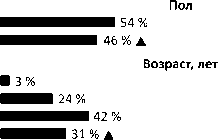
Доход на семью, тыс. руб. ^^Н 29 % ^^М 35 % ▲ ■ 11 % ■ 11 %
ГЕО ^^М 38 % М 17 % М 17 % ▲ ■ 8% ■ 8% ■ 6% ■ 2% I 1%
• п=2092
• 12+ заказов за 6 мес.
• Средний возраст - 43 лет
• Средний доход на семью - 95 159 руб.



^^^Н 40%
^Н 20 % ▲
М 14 %
■ 8%
■ 8%
■ 7%
0 %
I 1%
Семейное положение

Рис. 1. Профиль респондентов / Fig. 1. Respondents profiles Источник: составлено авторами.
Профиль респондентов имеет ряд отличий от портрета типичного покупателя интернет-магазина. В целом к этой категории относят порядка 54,4 % трудоспособных россиян, или 64,8 млн человек, большая часть из которых женщины (52,5 %); женаты или замужем 63,3 %, из них 26,6 % – в возрасте от 25 до 34 лет, 25,1 % – от 35 до 44 лет и 19,7 % – от 45 до 5410. Эти данные коррелируют с профилем респондентов из проведенного исследования, однако наблюдается некоторое расхождение в уровне доходов. Ввиду недостаточности количественных исследований шеринг-экономики аренды товаров точно охарактеризовать генеральную совокупность данного сегмента потребителей не представляется возможным.
Вовлеченность в шеринг-экономику в сегменте аренды товаров
Только 2 % всех опрошенных арендовали товары за последний год. В числе респондентов, которые не пользовались арендой товаров, 17 % знают о такой услуге и только у 18 % респондентов возникала такая потребность (рис. 2).
Среднее
Ничего из перечисленного 88 %
Самокат 7 %
Автомобиль 5 %
Велосипед 2 %
Товар 2 %
База 3390
Знают об аренде товаров 17 %
База 3339
Возникла потребность 18% в аренде товаров
База 3339
Активные покупки
Опыт аренды за год ^^^^^^Ш 89% ■ б% ■ 4%
I 1%
12%
Знание услуги аренды товаров
М 21% ▲
Знание услуги аренды товаров
И 16 %
Активные возвраты
^^^^^^И 87% ■ 8% А ■ 6% ▲
I 2 % А 11% 2092
М 15% 2062
^Ш 15 % А
А Значимо выше другой группы
Рис. 2. Осведомленность об аренде товаров на российском рынке / Fig. 2. Awareness of goods rental opportunities in Russian market
Источник: составлено авторами.
В целом у респондентов не наблюдается высокой степени вовлеченности в шеринг-экономику. Только 12 % респондентов брали в аренду какой-либо физический актив. И чаще всего они арендовали самокат (7 %) и автомобиль (5 %). Если рынок аренды самокатов (кикшеринг) находится в стадии активного роста, то рынок аренды автомобилей (каршеринг) вполне развит и уже вошел в повседневную жизнь жителей крупных городов, где присутствуют соответствующие сервисы (Лапидус и Гостилович, 2023). При этом разница между осведомленностью потребителей о возможности взять в краткосрочную аренду автомобиль и возможности арендовать различные товары через специальные сервисы составляет всего 2,5 раза в пользу автомобилей, хотя объемы данных рынков различаются более чем в 50 раз11.
Среди респондентов, которые знают о существовании на рынке услуги аренды товаров, самой популярной площадкой является «Спортмастер» (17 %), затем идет «Связной» (12 %) и «Мобильные ТелеСистемы» (11 %); также 7 % респондентов отметили сервис по аренде детских товаров «Панда-прокат» и 2 % – “Toyrent”. При этом чаще всего респонденты пользуются арендой товаров от «Мобильных ТелеСистем». Компания «МТС» инвестирует не только в аренду товаров. Так, в I квартале 2022 года ею были направлены 740 млн рублей в кикшеринг – сервис по аренде самокатов “Urent”12.
По частоте использования сервисов для аренды товаров респонденты распределились следующим образом: большинство (76 %) брали в год 1–2 товара, 18 % использовали 3–5 товаров, 4 % – 6–10 и только 2 % респондентов воспользовались данными сервисами от 11 до 20 раз в год. В среднем типичный пользователь шеринг-сервисов аренды товаров берет в год две единицы товаров (рис. 3).
Самой популярной категорией для аренды товаров являются «инструменты для ремонта» (33 % респондентов), на втором месте – «детские товары» (25 %). Товары в категориях «спорт и отдых», «товары для дома» и «уборка и клининг» берут 16, 14 и 12 % респондентов соответственно (рис. 4).
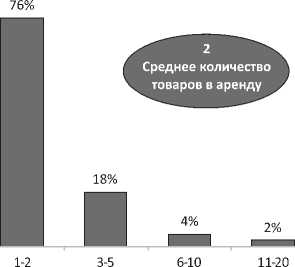
Рис. 3. Количество арендуемых товаров за год / Fig. 3. Annual amount of rented goods
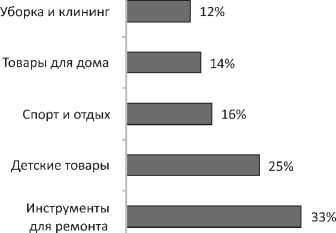
Рис. 4. Популярность категорий для аренды товаров / Fig. 4. Goods categories popular for rent
Источник: составлено авторами.
Источник: составлено авторами.
По данным сервиса “Next2U”, в 2021 году объем транзакций по аренде вещей вырос на 85 %. Самыми популярными категориями оказались костюмы для маскарада (рост запросов на 273 %, число сделок увеличилось более чем вдвое) и детские товары (стали искать чаще в 2,5 раза)13.
Драйверы и барьеры аренды товаров
Возможность взять в аренду товар, который понадобится «пару раз» (53 %), и возможность попробовать, подходит ли данный товар (46 %), – главные драйверы аренды товаров. При этом в первую очередь думают об экономии только 17 % активных покупателей и 20 % пользователей, которые активно возвращают товары; переживают о долговременном хранении в среднем только 12 % респондентов (рис. 5).
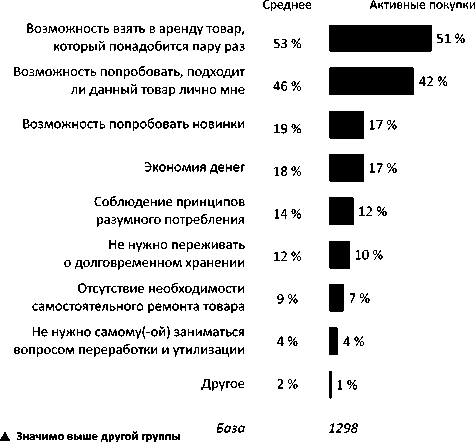
2 %
Рис. 5. Драйверы развития сегмента аренды товаров / Fig. 5. Drivers for goods rental segment development
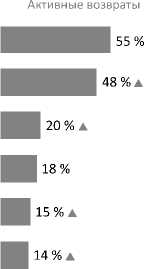
4%
6%
Источник: составлено авторами.
Результаты исследований Оскара Араухо и Ивана Де Ла Вега из Перу демонстрируют, что основными драйверами для участия в шеринг-экономике являются потенциальные экономические выгоды, достижение чувства общности, удовлетворение от процесса, устойчивость модели (Anaya and De La Vega, 2022, p. 15).
Барьерами для аренды товаров в первую очередь выступают страх, что придется оплачивать полную стоимость товара, если он сломается (41 %), и вероятная неисправность товара, бывшего в употреблении (38 %). При этом в среднем 30 % респондентов обращают внимание на комфорт использования чужой вещи и 25 % – на цену аренды. Параметр цены для группы респондентов «активные возвраты» важнее, чем для группы «активные покупки», на 5 %. Отдельно стоит обратить внимание, что вероятные неудобства, связанные с возвратом товара, отметили 16 % респондентов.
Среднее
Переживаю, что могу сломать товар и придется оплачивать полную стоимость ^1 %
Товар был в употреблении, он может быть неисправен /0
Некомфортно пользоваться «не своей» вещью 30 %
Цена на аренду обычно достаточно высокая, брать в аренду так же невыгодно 25 Л
Необходимость залога 17 %
Кажется, что процесс возврата товара доставит неудобства ^^ ^
Необходимость соблюдения сроков 8 %
Другое 1 %
Активные покупки Активные возвраты
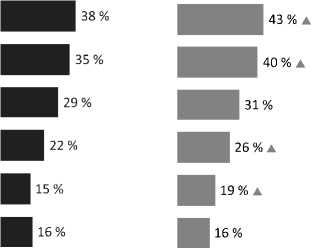
И 8 % 8 %
| 1 % | 1 %
1298 2092
-
▲ Значимо выше другой группы
Рис. 6. Барьеры для развития сегмента аренды товаров / Fig. 6. Barriers to goods rental segment development
Источник: составлено авторами.
Исследователи из Кельнского университета выделяют следующие барьеры аренды товаров в экономике совместного потребления: сложность процесса аренды, отсутствие доверия, конфиденциальность данных, риск поломки товара, нежелательное социальное взаимодействие, низкая вариативность способов аренды (Spindeldreher et al., 2019, p. 1).
Заинтересованность респондентов в аренде потребительских товаров
Потенциально заинтересованы в аренде товаров 40 % респондентов. И первоочередной интерес вызывают инструменты для ремонта (40 %). Товары для туризма потенциально готовы взять в аренду 25 % респондентов, товары в категории «спорт и отдых» – 23 %. Группа «активные возвраты» в большей степени готова арендовать товары в категории «уборка и клининг»: 22 % против 19 % группы «активные покупки». Сре дствами для реабилитации и электроникой готовы воспользоваться 20 и 17 % соответственно. Малую бытовую технику (МБТ) респонденты готовы арендовать чаще крупной бытовой техники (КБТ): 15 % против 10 %. Детские товары интересуют 9 % респондентов, а меньше всех респондентов (только 5 %) готовы совместно использовать одежду и обувь (рис. 7).
Инструменты для ремонта
Товары для туризма
Спорт и отдых
Уборка и клининг
Средства реабилитации
Электроника
МБТ
Фото- и видеотехника
Товары для дома
Гейминг и VR
Музыкальные инструменты
Товары для авто
КБТ
Детские товары
Товары для животных
Одежда и обувь
База
▲ Значимо выше другой группы
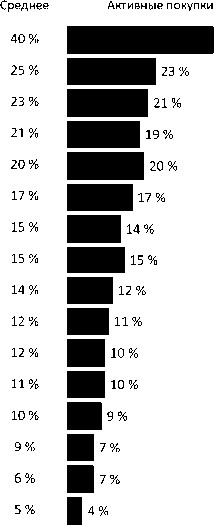
3339 1277
Активные возвраты

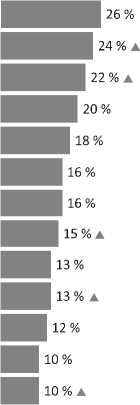


Рис. 7. Заинтересованность в аренде товаров по категориям / Fig. 7. Interest to rental of goods, by category
Источник: составлено авторами.
Таким образом, категория «одежда и обувь» на российском рынке представляет низкий интерес для потребителей, что существенно отличает отечественный рынок от общемировых тенденций, особенно ярко проявляющих себя на рынках США, Европы и даже Индии (Jain and Mishra, 2020).
ЗАКЛЮЧЕНИЕ
В статье были рассмотрены теоретические аспекты шеринг-экономики в сегменте аренды потребительских товаров. Обзор литературы показал, что данная область научных исследований находится на начальной стадии развития. Из всех сфер аренды товаров наиболее изученной является аренда одежды, однако в России всего 5 % пользователей этих сервисов готовы арендовать именно одежду. Также было предложено описание типовой бизнес-модели маркетплейса аренды товаров по Дэвиду Тису.
Арендой вещей в течение 2022 года воспользовались 2 % опрошенных, которые в год в среднем берут два товара в аренду, при этом из тех, кто не пользовался данной услугой, 83 % не знают о ней, а однозначно сообщают о такой потребности 18 % респондентов. Было выявлено два основных драйвера для развития сегмента аренды товаров в России: 1) возможность использования товара, который понадобится «пару раз»; 2) возможность попробовать, подходит ли данный товар. Основными барьерами для развития шеринга товаров выступают: 1) риск оплаты полной стоимости товара в случае его поломки; 2) риск получить заведомо сломанный товар. Потребители, которые чаще всего возвращают товары в режиме онлайн, меньше знают о возможности брать товары в аренду, при этом у них чаще возникает в этом потребность. Потенциально заинтересованы в услугах онлайн-сервисов аренды товаров в России 40 % респондентов. В первую очередь пользователям интересна аренда инструментов для ремонта, товаров для туризма, спорта и отдыха, уборки и клининга.
Таким образом, российский рынок аренды товаров достиг средней степени зрелости. Для дальнейшего развития этого сегмента шеринг-экономики в первую очередь необходимо работать над осведомленностью потребителей о данной возможности и эффективнее управлять рисками арендатора за порчу товара. Учитывая темпы роста шеринг-экономики и наметившийся тренд на рост числа игроков и их выручки в данном сегменте, можно заключить, что выход на рынок аренды товаров откроет новые горизонты для развития бизнеса и инноваций.
Список литературы Оценка зрелости шеринг-экономики в России: рынок аренды потребительских товаров
- Лапидус Л. В. Цифровая экономика: управление электронным бизнесом и электронной коммерцией. М.: ИНФРА-М, 2023. 479 с.
- Лапидус Л. В., Гостилович А. О. Совершенствование качества услуг кар-шеринговых сервисов. Оценка лояльности и потребительской удовлетворенности //Маркетинг и маркетинговые исследования. 2023. № 1. С. 64-77. https:// doi.org/10.36627/2074-5095-2023-1-1-64-77.
- Acquier A., Carbone V., Massé D. How to create value(s) in the sharing economy: Business models, scalability, and sustainability // Technology Innovation Management Review. 2019. Vol. 9, № 2. P. 5-24. http://doi.org/10.22215/timreview/1215.
- Alaei S., Aslani S., Talebian M. The relative importance of the business model motive for customer participation in the sharing economy // Sustainable Production and Consumption. 2022. Vol. 34. P. 190-201. https://doi.org/10.1016/jj. spc.2022.09.012.
- Anaya Ó., De La Vega I. Drivers of the sharing economy that affect consumers' usage behavior: Moderation of perceived risk //Administrative Sciences. 2022. Vol. 12, № 4. Art. № 171. https://doi.org/10.3390/admsci12040171.
- Bouncken R. B., Kraus S., Martínez-Pérez J. F. Entrepreneurship of an institutional field: The emergence of coworking spaces for digital business models // International Entrepreneurship and Management Journal. 2020. Vol. 16. P. 1465-1481. https://doi. org/10.1007/s11365-020-00689-4.
- Curtis S. K., Mont O. Sharing economy business models for sustainability // Journal of Cleaner Production. 2020. Vol. 266. Art. № 121519. https://doi. org/10.1016/j.jclepro.2020.121519.
- D'Adamo I., Lupi G., Morone P. et al. Towards the circular economy in the fashion industry: The second-hand market as a best practice of sustainable responsibility for businesses and consumers // Environmental Science and Pollution Research. 2022. Vol. 29. P. 46620-46633. https://doi.org/10.1007/s11356-022-19255-2.
- Ethnographies of collaborative economies across Europe: Understanding sharing and caring / Ed. by P. Travlou, L. Ciolfi. London: Ubiquity Press, 2022. 276 p. https:// doi.org/10.5334/bct.
- Feng Y., Tan Y. (R.), Duan Y. et al. Strategies analysis of luxury fashion rental platform in sharing economy // Transportation Research Part E: Logistics and Transportation Review. 2020. Vol. 142. Art. № 102065. https://doi.org/10.1016/j.tre.2020.102065.
- Gleim M. R., Stevens J. L., Johnson C. M. Platform marketplaces: unifying our understanding of lateral exchange markets // European Journal of Marketing. 2023. Vol. 57, № 1. P. 1-28. https://doi.org/10.1108/EJM-05-2021-0361.
- Gu H., Zhang T. (Ch.), Lu C. et al. Assessing trust and risk perceptions in the sharing economy: An empirical study // Journal of Management Studies. 2021. Vol. 58, № 4. P. 1002-1032. https://doi.org/10.1111/joms.12678.
- Hsu Ch.-Ch. The role ofthe core competence and core resource features ofa sharing economy on the achievement of SDGs 2030 // Journal of Innovation & Knowledge. 2023. Vol. 8, № 1. Art. № 100283. https://doi.org/10.1016/j.jik.2022.100283.
- Jain S., Mishra S. Luxury fashion consumption in sharing economy: A study of Indian millennials // Journal of Global Fashion Marketing. 2020. Vol. 11, № 2. P. 171-189. https://doi.org/10.1080/20932685.2019.1709097.
- Laudien S. M., Martínez J. M., Martín J. M. Business models based on sharing fashion and accessories: Qualitative-empirical insights into a new type of sharing economy business models // Journal of Business Research. 2023. Vol. 157. Art. № 113636. https://doi.org/10.1016/j.jbusres.2022.113636.
- Liu N., Lin J., Guo S. et al. Fashion platform operations in the sharing economy with digital technologies: Recent development and real case studies // Annals of Operations Research. 2022. Vol. 329. P. 1175-1195. https://doi.org/10.1007/ s10479-022-04544-3.
- Loussaief L., Ulrich I., Damay C. How does access to luxury fashion challenge self-identity? Exploring women's practices of joint and non-ownership // Journal of Business Research. 2019. Vol. 102. P. 263-272. https://doi.org/10.1016/j.jbusres.2019.02.020.
- Mai E. (S.), Ketron S. How retailer ownership of vs. collaboration with sharing economy apps affects anticipated service quality and value co-creation // Journal of Business Research. 2022. Vol. 140. P. 684-692. https://doi.org/10.1016/j. jbusres.2021.11.039.
- Pantano E., Stylos N. The Cinderella moment: Exploring consumers' motivations to engage with renting as collaborative luxury consumption mode // Psychology & Marketing. 2020. Vol. 37, № 5. P. 740-753. https://doi.org/10.1002/mar.21345.
- Scaraboto D., Figueiredo B. How consumer orchestration work creates value in the sharing economy // Journal of Marketing. 2022. Vol. 86, № 2. P. 29-47. https:// doi.org/10.1177/00222429211027777.
- Spindeldreher K., Ak E., Fröhlich J. et al. Why won't you share? Barriers to participation in the sharing economy [Электронный ресурс] // Proceedings of the Twenty-fifth Americas Conference on Information Systems. 2019. 12 p. URL: https://aisel.aisnet.org/amcis2019/adoption_diffusion_IT/adoption_diffusion_ IT/12 (дата обращения: 11.04.2023).
- TeeceD. J. Business models, business strategy and innovation // Long Range Planning. 2010. Vol. 43, № 2-3. P. 172-194. https://doi.org/10.1016/j.lrp.2009.07.003.
- Vargas C, Whelan J., Brimblecombe J. et al. Co-creation, co-design and coproduction for public health: A perspective on definitions and distinctions // Public Health Research and Practice. 2022. Vol. 32, № 2. Art. № e3222211. https://doi. org/10.17061/phrp3222211.
- Zhu X., Liu K. A systematic review and future directions of the sharing economy: Business models, operational insights and environment-based utilities // Journal of Cleaner Production. 2021. Vol. 290. Art. № 125209. https://doi.org/10.1016/ j.jclepro.2020.125209.

